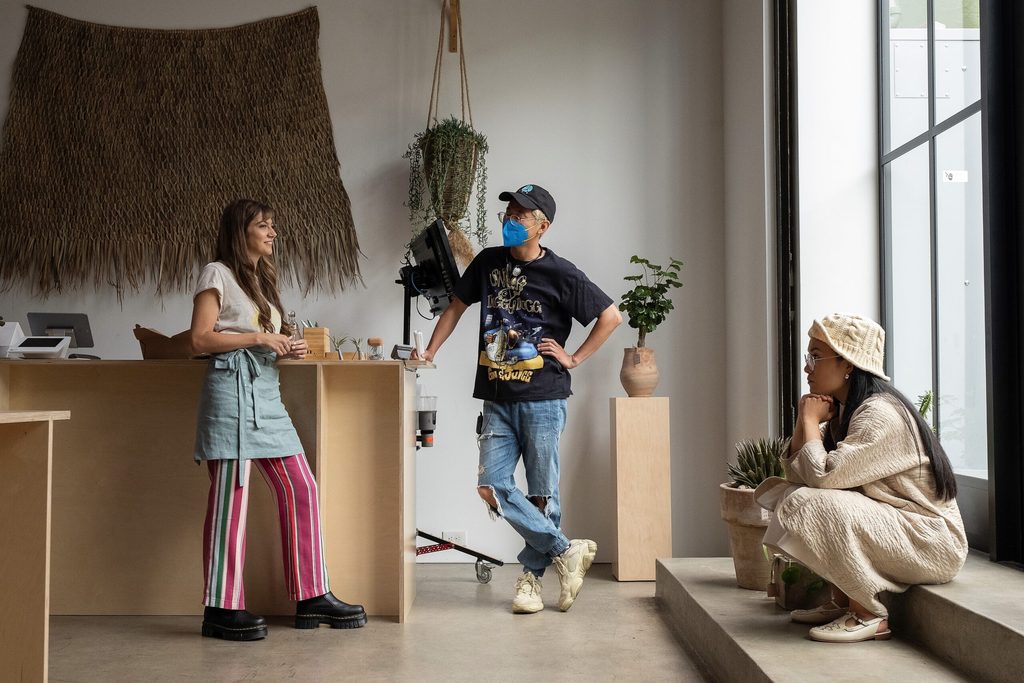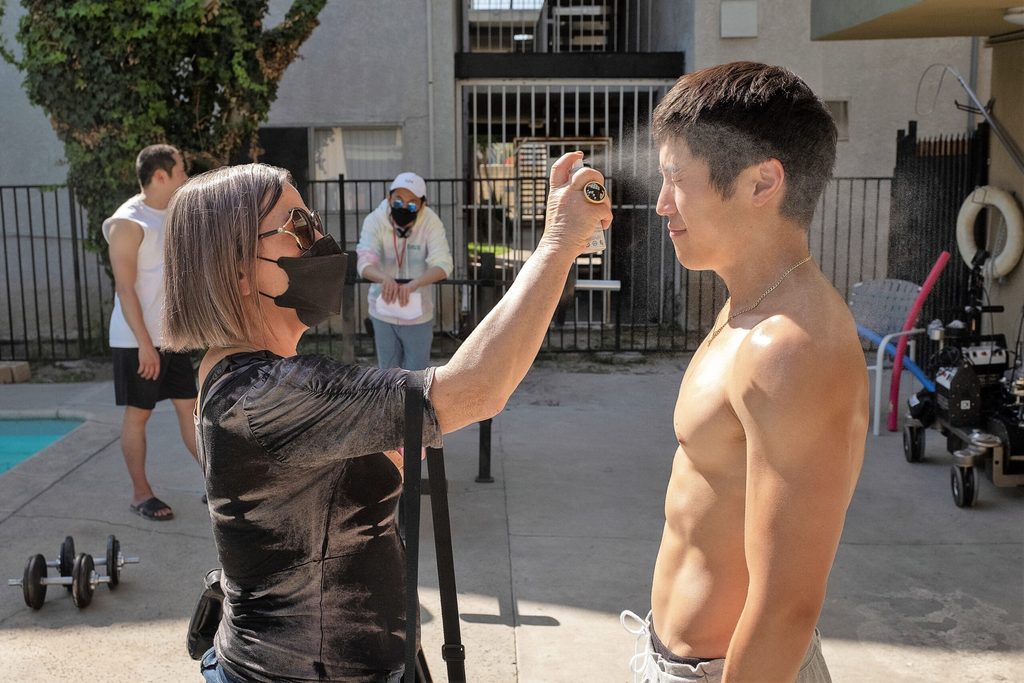SUMMARY
This is AI generated summarization, which may have errors. For context, always refer to the full article.
![[Only IN Hollywood] ‘Beef’ actors reveal how roles got them so angry they broke into hives](https://www.rappler.com/tachyon/2023/04/beef-collage.jpg)
LOS ANGELES, USA – Beef actors Steven Yeun and Ali Wong got so involved in playing angry that they actually broke out into hives. And creator Lee Sung Jin revealed that, at first, somebody like Stanley Tucci was being discussed as the adversary of Steven’s character, not Ali.
These were among the revelations in the Beef panel featuring Steven, Ali, and Sung – also the show’s producer, showrunner, and writer – at the SXSW (South by Southwest) Festival last month in Austin, Texas.
From the transcript that I obtained, I am sharing excerpts of the discussion on Beef, which has since become one of the most-watched shows on Netflix.
A mini-series that begins with a road rage incident involving Steven’s Danny and Ali’s Amy, Beef shatters the stereotypical reputation of Asians as the model minority.
Sung brilliantly expounds on the anger that’s seething inside many of us – the characters just happen to be Asian, which is another plus for the creator – and solidly crafts a spiraling story emanating from that seemingly simple road rage incident.
Steven and Ali, who are terrific, and the rest of the cast, including Joseph Lee (George), Ashley Park (Naomi), Young Mazino (Paul), David Choe (Isaac), and Patti Yasutake (Fumi) have made viewers binge watch. It is the most popular show on Netflix as I write this.
(Note: A controversy involving David Choe is resurfacing, emanating from a 2014 podcast in which he claimed to have forced a masseuse into oral sex. Choe has since apologized and maintained he concocted the story.)
Critics have also embraced the 10-episode show.

Naomi Ishisaka of The Seattle Times wrote: “…There’s nothing polite about Beef – and that’s the point. Angry, profane, and full of people making very bad choices, Beef is in many ways a groundbreaking moment for Asian American representation in media.”
Walter Chaw of Decider declared: “It’s a profound indictment of Hollywood wisdom that there isn’t enough Asian-American talent to populate a single motion picture, much less five hours of streaming content — and even if you could find the talent, that there wouldn’t be enough interest in the outcome to justify the effort.”
“I think the popularity and awards-season triumphs of The Daniels’ Everything Everywhere All At Once is the first pinhole leak in that dam of entrenched, smug, systemic racism — and Beef, debuting at the top of new programs on Netflix, might be the next.”
“What’s most exciting about both projects to me, however, is the extent to which seeing Asian-Americans cast in ‘normal’ roles has been, in an almost ecclesiastical sense of the word, awesome to behold.”

Beef perfectly matches the talents of the three figures who drive the show. From The Walking Dead, Steven has metamorphosed into a compelling lead actor in Okja, Burning, Minari, and now, Beef.
Ali, memorable as Sasha in Always Be My Baby and other films, sinks her teeth into Amy – and what a riveting portrayal she gives!
Sung (nicknamed Sonny), who has many TV writing credits, breaks through with Beef, his comedy-drama that mines the anger, emptiness, and dissatisfaction lurking behind our zen homes.
This Q and A was edited for brevity and clarity.
Moderator: You spend a lot of time being very angry. It is so visceral, this show. How do you get into it? And then how do you get out of it? Was it hard to decompress after exerting that kind of energy on being so fucking angry?
Steven Yeun: Our body shut down afterward, right?
Ali Wong: Yeah. Steven and I both broke out into hives. Mine was on my face.
Steven Yeun: Mine was all over my body.
Ali Wong: His was all over his body because he’s weak like that. No.
Steven Yeun: Sensitive. I’m sensitive.
Ali Wong: But yeah, it definitely took a toll on us that we didn’t even realize until after the show ended. I won’t even talk about what happened to your elbow.
Steven Yeun: Oh, yeah. That was fun.
Ali Wong: I don’t think we knew that was going to happen and if we knew what we were going to put our bodies and minds through, maybe wouldn’t have said yes to all of this. But we’re really glad we did.
What was the impetus for this story? Where did the idea come from?
Lee Sung Jin: The idea came from a real road rage thing that I went through. It was with a white SUV. It was a BMW though, not a Mercedes. And yeah, it honked at me, cursed at me, and drove away.
And for some reason on that day, I was like, I’m going to follow you. It didn’t end like it did in the show, thankfully. That’s why I’m here able to talk to you today.
But it definitely made me think about just how we live in such subjective realities and we project so much onto people that we don’t know all the time. I thought maybe there would be a show here. And so, yeah, thanks to A24 and Netflix encouraging me to pursue it, that’s why we’re here today.

So, you have this road rage incident. How do you take it from that experience to a show? Did you write a pilot first? How did you go about selling this project?
Lee Sung Jin: I didn’t write the pilot first. We actually got straight to series off a pitch, which is very rare. But we were able to do that because I mean, honestly, these two (Ali and Steven).
A lot of conversations. The joy of having them on as executive producers from the very start is just constantly talking and texting from me at 1:30 in the morning being like, ‘Danny (Steven), you think…how much do you love 3 Musketeers? You think you eat a lot of them?’
Steven Yeun: Yes, I do.
Lee Sung Jin: And obviously, Danny’s eating a 3 Musketeers bar when he’s coming to Amy’s. But yeah, just having that back and forth allowed us to really fill these characters fully before we took it out. I think that’s why it really resonated with the viewers.
Steven and Ali, as Sonny said, you are both executive producers. Did you have a lot of input into the evolution of the characters? Steven, I’ll start with you.
Steven Yeun: We have a lot of shared experiences. It’s cool to be able to tell a story like this that is deeply connective and human. And so, we’re just having fun mining small, intricate, authentic things.
Both Sonny and I grew up in a Korean church, so then you can just play with that and share the experience. Or we have uncles, cousins, or family members who have not been seen that we can pull from. That’s hopefully what it felt like watching.

Ali, how about you? Did you have any input into the evolution of Amy?
Ali Wong: Yeah. I do remember talking a lot throughout the development process. It’s just so surreal watching this again and it brings up so many memories of the conversations we had in 2020 over Zoom in COVID when we were all in our T-shirts and bottomless.
But I really have to give the most credit to Sonny. I’ve never eaten a Burger King chicken sandwich (which Amy eats in one scene) in my life. It’s really beautiful to see Sonny express himself through this show and yes, and all of us.
Sonny, did you have actors in mind when you were conceiving the show?
Lee Sung Jin: Steven was the first person outside of Ravi (Nandan, A24 head of TV) whom I told the idea. In that first conversation, we talked for three hours.
Conversations with Steven usually start with a very simple thing like, ‘Hey, I want to talk to you about a show’ and then three hours later, we’re like, ‘Why is God the way He is?’ And so, all those conversations definitely helped spawn the show.
And then for maybe half a day, we were like, ‘What if you were up against Stanley Tucci?’ And that felt too literal at first thought.
And then Ali happened to call me about something else and we caught up and she just had such a funny way of talking about harsh things in life and made me think, ahh, what about Ali? And then once we were all onboard, it just came together very fast.
This is really a departure for you, though. It’s a very different role. And even though Beef is billed as a dark comedy, it is hugely dramatic, emotional. And it’s really contemplative. So, I wonder how you readied for the role?
Ali Wong: People always ask me too about the gun masturbation scene and if that was difficult. That wasn’t difficult. I was like, I got this, it’s fine.

The difficult, the more challenging parts were some therapy scenes where I sit and talk for a long time. I’m used to being able to gesture and have a lot of different inflections in my voice and everything.
So that was something I’ve never done before. I have to give a lot of credit to our heads of departments. The costume designer purposely dressed me in a lot of neutrals which I don’t wear usually. I dress kind of very expressive and loud.
But Amy has these insane thoughts. She’s kind of costumed herself in these zen outfits. She’s really in a maze of her own creation.
And then in the set design, Grace spaced out those bars in Amy’s home. She calculated to this perfect amount where it’s seemingly zen but her house also feels like a cage.
So anytime I was in my costume or in Amy’s space, I always felt like, this is supposed to be nice, and I asked for this, but I do feel a little trapped. And so, all of that really helped me prepare and get into it.
And also, because Steven, my God he’s so committed, he’s such an incredible actor and a good listener. I had no choice but to rise to the occasion.
Steven Yeun: Oh man.
Ali Wong: Because I didn’t want to embarrass myself.
Steven Yeun: Don’t let her fool you. She crushed it. She was right there out the gate. It was so breezy.
Ali Wong: Yeah. And then just having trust in Sonny and his vision. When he said, ‘Do it like this,’ I was like, ‘Okay.’ And that helps a lot.
Steven, this is also a pretty different role for you as well. What drew you to the character of Danny and the idea of Beef as well? And did you inject any of Steven into Danny?
Steven Yeun: A little bit. Maybe what attracted me is that we got to play with something that maybe we’re not asked to on the surface, which is our shadow selves. This whole show is kind of about every character’s shadow self and we all have that.
To tap into that and get paid for it is great. And have your friends with you and have this story so that we can connect with you all about it and hopefully make you feel seen too.
Because this shit’s like very common, surprisingly. So that was really liberating and fun and so I just jumped at it.

You’ve all been friends for a while. What was that like to have these highly intense, dramatic scenes with your friends?
Ali Wong: It’s interesting because even watching the pilot, I got emotional at the end because when I’m chasing after Steven, that was the first thing we shot together. After the first take of me running after him, we were laughing hysterically and there are pictures of us.
We’re like hugging and laughing and we’re just like, I can’t believe we’re doing this together. Even though we go up against each other in this series, in between takes, I remember in Amy’s house, we would unplug our mics, go off into the corner, go on the stairs, just gossip and giggle.
So we were making a show and it’s really hard work but it was, even now, it’s just so nice to be doing this with friends.

How about you, Steven? What was it like for you to work with such good friends playing this kind of role?
Steven Yeun: It keeps you feeling safe, it helps you to be more honest and you’re not left on your own vulnerability. But you’re kind of sharing in this thing.
That’s the only real way that Ali and I could get together and just ream each other out. You’re going to see more and it’s really fun. The beauty of chemistry is that we get to be safe and friends and sit in love and then just totally go at each other on screen.
Steven, how did you decompress, outside of getting all these physical issues?
Steven Yeun: Afterwards, I had to spend some time just chilling out. But what was really nice is when you get to express this all in that safety of friendship and on set, then you go home and you’re like, I don’t get to really explore that anywhere else.
So, it wasn’t too bad. It was just the holding of the tension that was really gnarly but it just keeps going. We’re all living in it.
I think it’s finding that balance of trying to be chill because this is always hard. It’s gnarly. So, trying, trying.
Sonny, you really explore these themes of class divide in the show. Although Amy and Danny’s lives could not be more different and polar opposite, there are similarities in their demeanor. Talk about that desire to want to convey that.
Lee Sung Jin: Probably because I’ve been both Danny and Amy, when I started writing, I was quite poor and had a lot of Danny-isms constantly and was very sad inside.
Now here I am at South By Southwest with a show and I’m probably still sad inside. So, this feeling never goes away and so you have to try and figure out how to accept it and live with it. And that’s why I wrote the show the way I did.
One of the reasons why this show really resonates with people – there’s so much that is absurd about it because impulsive anger is absurd. We’ve all been there, whether it’s a road rage accident or something.
We’re so close to being just set off at any moment and you often have to deal with the ripple effects of that. What are you hoping that audiences take away from this experience?
Lee Sung Jin: I hope everyone takes what they need for wherever they’re at. But for me, there was a Carl Jung quote that really was north star for a lot of the writing.
And he said, ‘One does not become enlightened by imagining figures of light, but by making the darkness conscious.’ We spend a lot of time with our masks and personas on as we interact with one another.

That separateness causes us to feel like, oh, these things that we only know in our own brains, like no one else does. That can lead to shame, isolation and feeling alone.
The more we are like, oh, I actually have thought that before too, or I’ve actually even done that before. If we would just take our masks off once in a while, the need to go as crazy with expressing some of these things wouldn’t be as high. That’s kind of my takeaway from the show.
Ali Wong: I just hope people see themselves in parts of the show and that they find a connection and feel less alone.
Steven Yeun: I hope you find comfort and I hope it’s fun. I hope you just watch it with your friends and family, just talk about it and laugh at everyone and laugh at ourselves. We’re so weird. It’s great.
Sonny, what can we expect in future episodes? And Ali and Steven, what are you most excited for audiences to see?
Ali Wong: I’m most excited for people to see the finale because it’s really different. It’s unlike anything we’ve ever seen before.
Steven Yeun: I’m just excited for you guys to go on the ride because it just gets crazier and crazier. So, I’m excited.
Lee Sung Jin: I’m excited for you to rewatch it as many times so that we get those sweet hours viewed and break some records.
– Rappler.com
Add a comment
How does this make you feel?

There are no comments yet. Add your comment to start the conversation.